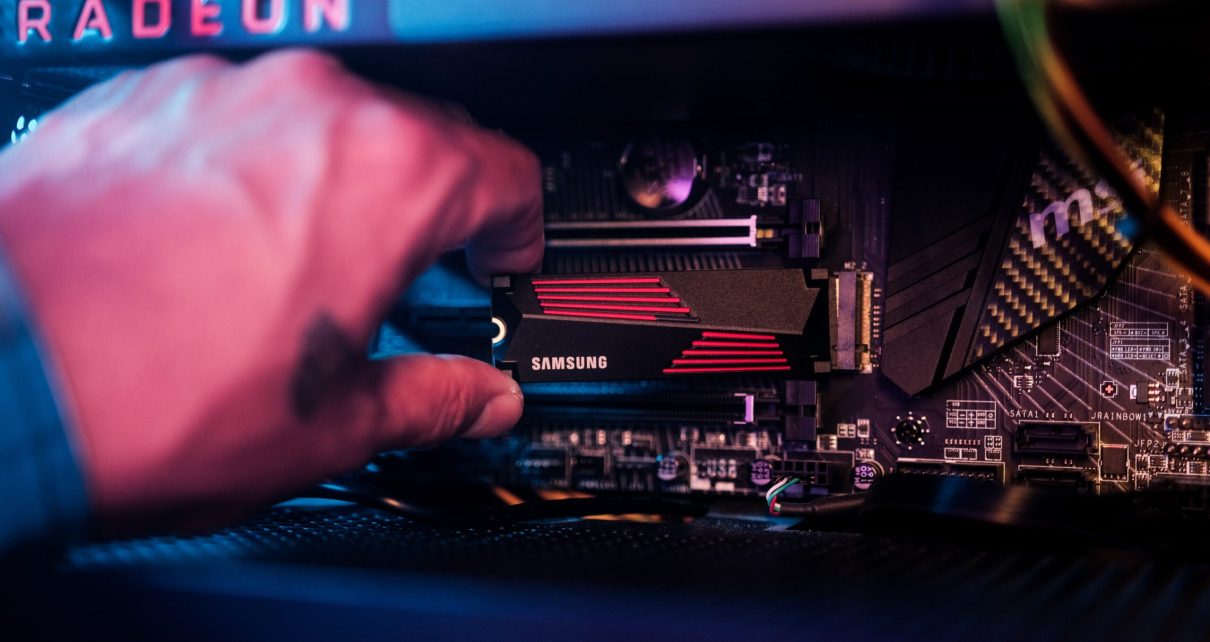Introduction to HDD and SSD
Storage options have come a long way in the fast-paced world of technology. Gone are the days of bulky hard disk drives (HDD) being your only choice for storing your precious data. Enter the sleek and speedy solid-state drives (SSDs). But which one is truly superior? In this epic battle of HDD vs SSD, we’ll dive into the details to determine which storage option reigns supreme. Buckle up, tech enthusiasts – it’s about to get storage-savvy here!
Speed Comparison: Which is Faster? (HDD vs SSD)
Speed is crucial in choosing the right storage option for your needs. HDDs and SSDs differ significantly in speed, with SSDs generally offering faster performance.
One key reason why SSDs are faster is that they have no moving parts. Unlike traditional HDDs, which rely on spinning disks and mechanical read/write heads, SSDs use flash memory to store data. This means accessing and retrieving information from an SSD is much quicker than an HDD.
The difference in speed becomes even more apparent when booting up your computer or launching applications. An SSD can drastically reduce the time it takes for your system to start up, allowing programs to load almost instantaneously.
In addition, file transfer speeds are notably faster with an SSD. Whether you’re copying files or installing software, the increased rate of an SSD can save you valuable time.
It’s important to note that not all SSDs are created equal – different types and models offer varying performance levels. However, as a general rule, if speed is your top priority, investing in an SSD would be the better choice over an HDD.
In summary, When comparing speed between HDD and SDD options for storage devices, Solid State Drives (SSDs) offer superior performance due to their lack of moving parts and reliance on flash memory technology instead of spinning disks used by Hard Disk Drives (HDD). The absence of physical components allows access times and file transfer speeds via SDD storage units to surpass those achieved by conventional counterparts using magnetic platters paired with internal mechanical readers/writers.
Durability and Reliability: Which Lasts Longer?
Durability and reliability are key factors when choosing between HDD and SSD storage options. While both have their strengths, it’s essential to understand how they differ regarding longevity.
HDDs, which use spinning disks and mechanical parts, have existed for decades. They are known for their durability, as they can withstand physical shocks and vibrations without compromising their data. This makes them a reliable choice for situations with a high risk of accidental drops or impacts, such as in laptops or portable devices.
On the other hand, SSDs have no moving parts and rely on flash memory technology. This gives them an advantage regarding reliability because fewer components can fail over time. SSDs are less prone to physical damage from drops or jolts without spinning disks or mechanical arms.
In terms of lifespan, HDDs typically last longer than SSDs due to their design. The moving parts in HDDs may eventually wear out after years of continuous use. However, with advancements in technology and improvements in manufacturing processes, modern SSDs now offer better endurance ratings than before.
It’s worth noting that both types of storage devices come with warranties that assure failure or defects. Also, proper care and regular backups should be implemented irrespective of the option chosen to ensure data safety.
The decision between HDD and SSD comes down to individual needs and preferences regarding durability versus speed performance trade-offs. For those seeking long-lasting durability under harsh conditions or environments prone to physical impact risks, an HDD could be a more suitable choice. However, if speed performance is prioritized alongside good resistance against sudden knocks or jolts, then an SDD would be ideal.
Price Comparison: Which is More Affordable? (HDD vs SSD)
When choosing between HDD and SSD storage options, price is a factor that needs to be considered. Let’s take a closer look at the cost differences between the two.
HDDs have been around for a long time and are generally more affordable than their SSD counterparts. This is primarily due to the difference in technology used. HDDs use spinning disks and mechanical components, which are cheaper to manufacture than the solid-state memory chips found in SSDs.
On the other hand, SSDs are pricier because they offer significant performance benefits over HDDs. An SSD’s faster read and write speeds can significantly enhance overall system performance, making them particularly attractive for gamers or professionals who require quick data access.
However, as technology advances and production costs decrease, we see a gradual decrease in the price gap between HDDs and SSDs. In recent years, prices for SSD drives have become more competitive, making them increasingly accessible to consumers with varying budgets.
It’s important to note that while initial purchase costs may lean towards HDDs being more affordable upfront, additional factors, such as maintenance costs and potential data loss risks, need consideration when evaluating long-term affordability.
When deciding which storage option is more affordable for you or your business needs, weighing your specific requirements against your budget constraints before making a final decision is essential.
Storage Capacity: How Much Can Each Hold? (HDD vs SSD)
Regarding storage capacity, HDDs (Hard Disk Drives) and SSDs (Solid State Drives) offer options catering to different needs.
HDDs have traditionally been known for their larger storage capacities compared to SSDs. These reliable workhorses can hold terabytes of data, making them perfect for users requiring vast storage space. Whether you’re a professional photographer with countless high-resolution images or a gamer with an extensive library of games, an HDD can accommodate your needs without breaking a sweat.
On the other hand, while SSDs may not match the sheer capacity of HDDs, they make up for it in terms of speed and performance. With technological advancements, SSDs come in sizes ranging from 120GB to several terabytes. This makes them suitable for everyday users prioritizing speedy access to their files over raw storage space.
The average user might find that an SSD with a smaller capacity is more than sufficient for their needs. Many people primarily use their computers for web browsing, document editing, and streaming media – activities that don’t necessarily require massive amounts of stored data.
In conclusion,
when considering storage capacity as a factor in choosing between an HDD and an SSD, it ultimately depends on your specific requirements. If you need copious amounts of storage space at an affordable price point and don’t mind sacrificing some speed, an HDD might be the better option. Alternatively, Investing in an SSD would be wise if you value fast boot times, quick file transfers, and snappy application launches above all else – even if it means compromising total storage size. When balancing speed versus capacity, choosing between these two types of drives should consider factors such as budget constraints, usage patterns, and personal preferences.
Energy Efficiency: Which Uses Less Power?
Regarding energy efficiency, there is a clear winner between HDD and SSD. Solid State Drives (SSDs) are known for their low power consumption compared to Hard Disk Drives (HDDs).
SSDs use flash memory chips to store data, which requires less power than HDD spinning disks. This means that SSDs consume significantly less electricity during operation. Not only does this make them more environmentally friendly, but it also leads to longer battery life in devices such as laptops and smartphones.
Furthermore, SSDs have no moving parts like HDDs do. This lack of mechanical components reduces power usage even further since there is no need for motors or actuator arms to move around and read data from rotating platters.
In addition to their lower power consumption, SSDs generate less heat than HDDs. This contributes to better energy efficiency and helps prolong your device’s lifespan by reducing thermal stress on its components.
If energy efficiency is a top priority for you or if you want a storage option that maximizes battery life in portable devices, then an SSD would be the ideal choice. Its lower power consumption benefits the environment and provides practical advantages for everyday use.
Conclusion and Recommendations for Different Needs (HDD vs SSD)
After analyzing the various aspects of HDDs and SSDs, it is clear that both storage options have their strengths and weaknesses. The best choice depends on your specific needs and priorities.
If you are looking for sheer speed and performance, SSDs are the way to go. They offer lightning-fast boot times, quick file transfers, and smooth multitasking capabilities. This makes them ideal for gamers, professionals working with demanding software applications, or anyone who values snappy responsiveness in their computing experience.
On the other hand, HDDs still hold a significant advantage if you need large amounts of storage at an affordable price point. Whether you’re a content creator with massive video files or simply someone who wants to store extensive media libraries or backups without breaking the bank, HDDs provide ample capacity without draining your wallet.
Durability-wise, SSDs come out on top thanks to their lack of moving parts. With no spinning disks or mechanical components that can wear out over time, they are less prone to failure due to physical damage or shocks. However, if longevity is your primary concern and you’re willing to sacrifice some speed in return for peace of mind regarding data retention over extended periods – perhaps as part of an archival solution – then opting for an HDD might be more suitable.
Regarding energy efficiency, SSDs have a slight edge over traditional hard drives since they consume less power during operation. If maximizing battery life is crucial for your laptop usage or reducing electricity bills matters in enterprise-scale deployments involving numerous industries, choosing an SSD can help achieve these goals while still providing reliable performance.
Read More: Choosing the Right Gaming Headset for Your Gameplay Needs



